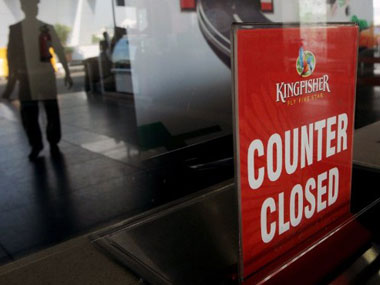New Delhi: The writing on the wall has been clear for Kingfisher for the last six months. But now it is stark: bring in Rs 1,000-1,500 crore immediately, or quit.
Kingfisher’s rivals are now wishing it dies quickly. While Jet Airways has opposed efforts by some travel portals to sell Kingfisher tickets under special fares, other airlines are secretly said to be lobbying the government to delay foreign investment in aviation so that Kingfisher can be driven out of the business quickly.
Which is why an immediate cash infusion is the only way for Kingfisher to survive. Without plonking $200-300 million (Rs 1,000-1,500 crore) on the table, the airline is likely to vanish into thin air. It is already struggling to pay tax dues and money owed to other stakeholders and is fielding innumerable queries on schedules and flight safety from the aviation regulator, the Directorate-General of Civil Aviation (DGCA).
[caption id=“attachment_255548” align=“alignleft” width=“380” caption=“With Kingfisher in withdrawal mode, competing airlines have been able to raise fares by about 15-20 percent. It is a no-brainer that if Kingfisher leaves the aviation market, all other airlines stand to benefit.”]  [/caption]
Its competitors, who are bleeding no less, are thus keen to turn the knife in.
Already, Jet Airways has begun opposing the ‘opaque fare’ practices of Kingfisher which allows it to sell tickets below cost price on some travel portals since the customer gets to know the airline’s identity only after purchasing the ticket. Jet’s opposition is strange, since portals say this practice has been used in the past by other airlines like SpiceJet as well. A SpiceJet spokesperson denied offering opaque fares.
Impact Shorts
More ShortsWith Kingfisher in withdrawal mode, competing airlines have been able to raise fares by about 15-20 percent. It is a no-brainer that if Kingfisher leaves the aviation market, all other airlines stand to benefit. Already, its operations are down to a fourth, from 64 aircraft to 16. The fare jump by competitors is sharper on those routes where Kingfisher was the primary airline.
Coming back to opaque fares, Kingfisher began this practice some 6-8 months back because travel agencies/portals give upfront cash to the airline, make a large margin themselves on selling tickets below normal fares. Not only has Jet begun complaining, but this practice is anyway killing Kingfisher itself.
“This means Kingfisher is selling way below cost and is hurting its bottomline further. Already, competitors are using some fair and some unfair means, though no one will say so upfront. It’s up to the decision-makers to act,” said Kapil Kaul of the Centre for Asia Pacific Aviation (CAPA)
Even on the issue of allowing foreign direct investment (FDI) by foreign airlines, Kingfisher’s competitors are involved in hectic, behind-the-scenes lobbying effort to prevent, or at least delay, any policy change. The commerce ministry has already floated a Cabinet Note seeking comments on whether to allow foreign airlines to invest up to 49 percent in Indian airlines - a move which is largely seen as benefiting Kingfisher - and lobbying against it could delay the process.
“Some rivals of Kingfisher are lobbying hard for this not to happen. They don’t even want to look at the overall benefit this decision might bring for the loss-making airline sector….other airlines feel this is jungle raj and prey should be killed when it is at its weakest,” said an executive of a large travel portal.
In the past, Jet Airways and SpiceJet have opposed allowing foreign carriers to invest in Indian airlines.
CAPA’s Kaul said that unless Kingfisher promoters manage to infuse $200-300 million upfront into the airline and agree to major management and board level changes suggested by prospective investors, the airline’s survival is difficult.
The DGCA is, meanwhile, expected to submit a report on Kingfisher to Civil Aviation Minister Ajit Singh on Monday (26 March). Last week the regulator expressed doubts over whether Kingfisher can sustain even its revised schedule or clear payments to vendors. So this report may be crucial to the airline’s survival.


)

)
)
)
)
)
)
)
)



